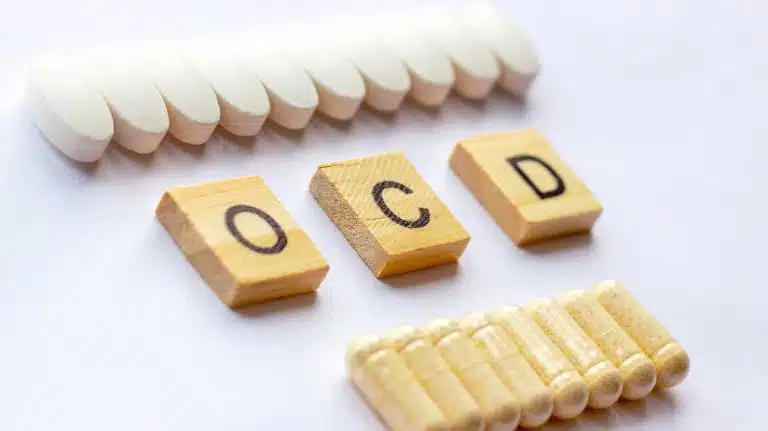OCD & Benzodiazepine Abuse

Obsessive-compulsive disorder (OCD) is an anxiety disorder that affects about 2.2 million adults in the United States.
Some people with OCD treat their anxiety symptoms using benzodiazepines. Also called “benzos,” these medications pose a high risk of abuse and addiction.
Symptoms Of Obsessive-Compulsive Disorder (OCD)
OCD involves obsessions, compulsions, or both.
Obsessions are repeated thoughts, images, or urges that cause anxiety and disrupt daily life. A person with OCD may obsess about anything. However, the most common obsessions include:
- an excessive fear of germs and diseases
- an excessive need for order or symmetry
- unwanted thoughts involving sex, violence, or religion
- fear of losing control over your behavior
Compulsions are behaviors you repeat over and over in an attempt to reduce the anxiety caused by obsessions. Common compulsions include:
- excessive cleaning or hand washing
- excessive counting
- repeatedly arranging items a certain way
- repeatedly checking for safety hazards, such as unlocked doors
- reviewing and analyzing unwanted, obsessive thoughts
In most cases, compulsions temporarily ease anxiety. Over time, though, they make the obsessions worse.
The Link Between OCD & Benzodiazepine Abuse
Benzodiazepines are depressants that increase the effect of a neurotransmitter (brain chemical) called gamma-aminobutyric acid, or GABA. Popular benzodiazepines include alprazolam (Xanax), clonazepam (Klonopin), diazepam (Valium), and lorazepam (Ativan).
Because these drugs slow down your thinking and make you feel relaxed, they’re sometimes used to treat OCD symptoms. However, most doctors only prescribe them for short-term use. That’s because they’re highly addictive.
You’re more likely to become addicted to a benzodiazepine if you abuse it. Abuse occurs when you use the drug in a manner not prescribed by your healthcare provider. For example, you might:
- take it more often than prescribed
- take higher doses than prescribed
- take it without a prescription
- mix it with alcohol or other drugs
- crush the pills and snort them
Signs Of Benzodiazepine Abuse & Addiction
In general, a person who’s abusing a benzodiazepine will frequently experience the drug’s side effects, which can include:
- drowsiness
- dizziness
- weakness
- confusion
- memory impairment
- unsteadiness
- nausea
- constipation
- dry mouth
- blurry vision
- slurred speech
Other signs of benzodiazepine abuse include withdrawing from family and friends, falling behind at work or school, and “doctor shopping” (visiting multiple doctors to get multiple prescriptions of benzodiazepines).
Abuse often leads to addiction. The main signs of benzodiazepine addiction are tolerance and physical dependence.
Tolerance means you need increasingly higher doses of the drug to feel the desired effects. Physical dependence means your body needs the drug to function normally. If you don’t use it, you may experience withdrawal symptoms such as:
- anxiety
- panic attacks
- irritability
- depression
- trouble sleeping
- sweating
- headache
- hallucinations
- seizures
Treatment For OCD & Benzodiazepine Abuse
If you or someone you love abuses benzodiazepines to self-medicate OCD, seek help at a dual diagnosis treatment program. These programs are designed to treat substance abuse that occurs alongside other mental health disorders, including OCD.
Depending on your needs, you can attend the program on an inpatient basis (which means you live at the treatment center) or an outpatient basis (which means you regularly attend the treatment center while living at home).
In most cases, your treatment plan will include psychotherapy, medication, and other recovery services.
Psychotherapy
The most common type of psychotherapy for OCD is cognitive-behavioral therapy (CBT). It helps you develop healthy coping skills to manage your OCD symptoms. With more control over your symptoms, you’re less likely to abuse benzodiazepines.
Many people with OCD benefit from a specific type of CBT called Exposure and Response Prevention (ERP).
ERP involves gradually exposing yourself to your obsessions without engaging in compulsions. Over time, this process can reduce your anxiety surrounding obsessions. You’ll then be able to experience unwanted thoughts, images, or urges without obsessing over them.
Medication
Not everyone with OCD needs medication. However, some people find it makes recovery easier. The most common medications used to treat OCD include:
- citalopram (Celexa)
- escitalopram (Lexapro)
- fluoxetine (Prozac)
- fluvoxamine (Luvox)
- paroxetine (Paxil)
- sertraline (Zoloft)
All of these medications belong to a class of antidepressants called selective serotonin reuptake inhibitors (SSRIs). Along with or instead of an SSRI, your doctor may prescribe a non-addictive anti-anxiety medication, such as buspirone (Buspar).
Recovery-Focused Services
In addition to therapy and medication, your treatment plan may include other recovery-focused services, such as:
- medical detox to help you slowly and safely stop using benzodiazepines
- support groups, where you can connect with other people recovering from substance abuse, OCD, and other mental illnesses
- family therapy, where your loved ones can learn how to best support your recovery
- wellness activities like exercise, mediation, and yoga
To learn more about treatment options for OCD and benzodiazepine abuse, please contact an Ark Behavioral Health specialist today.
Written by Ark Behavioral Health Editorial Team
©2024 Ark National Holdings, LLC. | All Rights Reserved.
This page does not provide medical advice.
Anxiety & Depression Association of America - Facts & Statistics
U.S. Drug Enforcement Administration - Drug Fact Sheet: Benzodiazepines
U.S. National Library of Medicine - Obsessive-Compulsive Disorder
Questions About Treatment?
Ark Behavioral Health offers 100% confidential substance abuse assessment and treatment placement tailored to your individual needs. Achieve long-term recovery.
100% confidential. We respect your privacy.
Prefer Texting?
Our friendly support team is here to chat 24/7. Opt out any time.







 Learn More
Learn More








